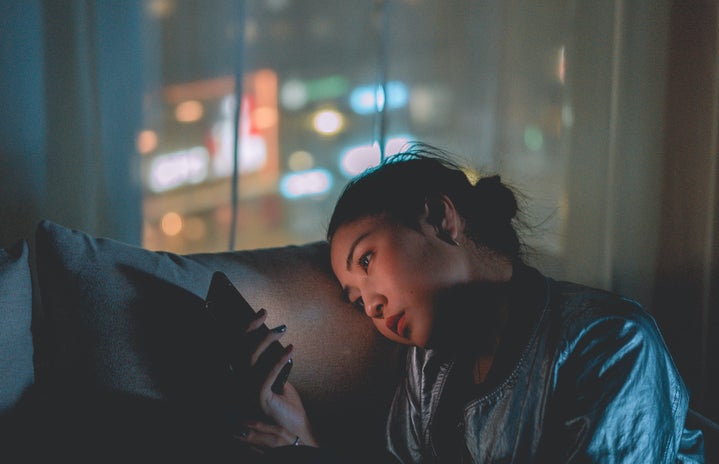**Trigger Warning// This article contains mention and detailed discussion of eating disorders.
I’ll never forget the day I signed up for an Instagram account. I was in sixth grade with curly hair, glasses and I thought I was of average height and weight. The minutes I spent on Instagram turned into hours, and eventually days of my life that turned into years of mental illness. I started analyzing every photo that came across my feed. “Am I that skinny?” “Do my legs look like that?” “Why am I not pretty?” and the answer to all my questions was always a big, fat, stomach sucking in, undeserving no.
How did a healthy, adolescent girl start visiting a therapist every week? Then the nutritionist, the pediatrician, the cardiologist and so on. As an adult looking back, I can pinpoint the moment that caused my life to spiral and resulted in hair loss, fatigue and no period – the moment I signed up for an Instagram account. Ed (a common term used to personify the little voice inside your head among patients with disordered eating) will now always be behind me, whispering down my neck as I look into a mirror or try on a new pair of jeans. I can’t help but think that I wouldn’t have this life long companion if I hadn’t signed up for social media so young.
Unfortunately, I’m not the only one with this story. So many young girls have lost themselves to social media. In the technology revolution, the supposed good that came from so many different platforms that promoted “connectivity” was what society glorified while millions of adolescents suffered in silence. The rapidly growing mental health crisis was shoved under a rug, while Facebook (owner of Instagram) chose to ignore the alarming data they were responsible for.
The article “Facebook Knows Instagram is Toxic for Teen Girls, Company Documents Show”, published by the Wall Street Journal, has created some ripples; however, it has not received as much attention as it so rightfully deserves. It highlights experiences from users that many will be able to relate to. Some speak about how logging into Instagram after feeling good instantly plummets their mood, or how every post is a competition that influences your status in the real world. These are not isolated experiences, so they should be talked about openly. The stigma around mental health and the extreme popularity of the app have resulted in limited conversation.
Internally, Facebook has been aware of the problem for years. The article details that in 2019, data that was presented to Facebook executives found “… [Instagram] make[s] body image issues worse for one in three teen girls.” This is an alarming statistic that shows just how influential social media can be. But yet, so many people write off developing females as being hormonal or just moody. Well, this particular argument was addressed by Dr. Twenge, a psychologist at San Diego State University. She described this view as “tempting,” but later said that therapists are treating more and more cases of clinical mental illness like never before. She said that many patients and colleagues believe this to be stemming from or exacerbated by Instagram.
This should be a wake up call for social media platforms, but Facebook hasn’t published any plan to help resolve the mental health crisis they’ve created within the next generation. What we’re looking at now is an entire generation raised on the social media platform, especially as Instagram and other social media companies target younger users in order to generate even more revenue. This next generation could be at risk for the greatest mental health crisis ever experienced, all credited to that little pink and orange app. The implications of a generation raised on social media are not fully known; however, from what we do know, the implications are mostly negative.
Instagram provides eating disorders, depression and other mental illnesses a platform to manifest and fester, creating a toxic environment for its users. Female users are the predominant victim to the toxicity; however, it’s important to note that others are susceptible to these experiences, too. I was on Instagram for less than three years before I had to be placed in intensive therapy, so how will years of scrolling shape mindsets and futures for the millions of users growing up on the platform?
My generation will be a worldwide case study for mental health issues related to social media use, but it’s not too late for the following generations to avoid the kind of suffering we’ve endured on Instagram. The change starts small- in attitudes towards social media use and young children and the way adults interact on the platform. We also need to call out Instagram in their development of targeting young children, and influence the big tech’s approach to its user experience. Instagram would not be popular if it weren’t for its billions of users they exploit for profit. Users are what drive the platform – if you’re an Instagram user, the change starts with you.


